Immune-boosting medicinal mushroom tea typically contains powerful fungi like reishi, chaga, lion's mane, and turkey tail. These mushrooms are rich in beta-glucans, polysaccharides, and triterpenes, which enhance your immune system and offer antioxidant benefits. You'll brew the tea by steeping dried or powdered mushrooms in hot water for 5-10 minutes, or longer for a stronger infusion. To improve flavor, you can add honey, lemon, or ginger. While these teas provide numerous health benefits, it's crucial to source high-quality mushrooms and consult a healthcare provider if you have any medical conditions. Exploring the various brewing techniques and complementary herbs can further enhance your mushroom tea experience.
Common Medicinal Mushrooms for Tea
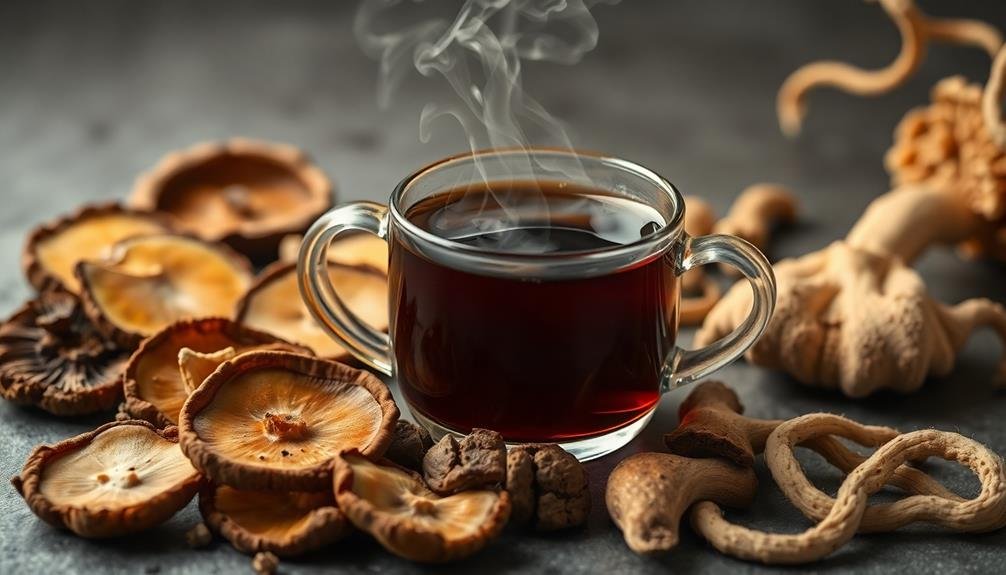
Among the most popular medicinal mushrooms for tea, you'll find reishi, chaga, lion's mane, and turkey tail. Each of these fungi offers unique potential health benefits when brewed into a tea.
Reishi, known as the "mushroom of immortality," is prized for its immune-boosting properties and stress-reducing effects. It's often used to promote relaxation and improve sleep quality.
Chaga, a parasitic fungus that grows on birch trees, is packed with antioxidants and may help lower inflammation and support overall immune function.
Lion's mane is renowned for its potential cognitive benefits. It's believed to stimulate nerve growth factor production, which could enhance brain health and memory.
Turkey tail, with its distinctive fan-like shape, is rich in polysaccharides that may strengthen your immune system and improve gut health.
When brewing these mushrooms into tea, you'll typically use dried and powdered forms. Steep them in hot water for 5-10 minutes, or follow the specific instructions provided with your mushroom tea product.
You can enjoy these teas individually or in blends that combine multiple mushroom varieties for a synergistic effect.
Key Immune-Boosting Compounds
When you brew mushroom tea, you're extracting powerful compounds that can boost your immune system.
Beta-glucans and polysaccharides are among the most important, acting as immunomodulators that enhance your body's defense mechanisms.
Triterpenes and terpenoids, also present in many medicinal mushrooms, offer additional immune support and anti-inflammatory benefits.
Beta-Glucans and Polysaccharides
The powerhouses behind mushroom tea's immune-boosting properties are beta-glucans and polysaccharides. These complex carbohydrates are found in abundance in medicinal mushrooms like reishi, shiitake, and turkey tail.
Beta-glucans are particularly effective at stimulating your immune system, acting as immunomodulators that can enhance the function of immune cells like macrophages and natural killer cells.
When you consume mushroom tea, these compounds interact with receptors on your immune cells, triggering a cascade of responses that strengthen your body's defense mechanisms. They can increase the production of cytokines, which are signaling molecules that help coordinate your immune response.
Polysaccharides, including beta-glucans, also have antioxidant properties that protect your cells from oxidative stress and inflammation.
Different mushroom species contain varying levels and types of these compounds. For example, reishi mushrooms are rich in ganoderic acids, while cordyceps contain unique polysaccharides called cordycepins.
Triterpenes and Terpenoids
Delving deeper into the immune-boosting compounds of mushroom tea, we encounter triterpenes and terpenoids. These potent organic compounds are found in various medicinal mushrooms and contribute greatly to their health benefits.
Triterpenes, such as ganoderic acids in reishi mushrooms, have been shown to possess anti-inflammatory, antiviral, and antitumor properties. They can help modulate your immune system and support overall health.
Terpenoids, closely related to triterpenes, are another group of bioactive compounds found in mushroom tea. They're known for their antioxidant properties and ability to enhance your body's natural defense mechanisms.
Some notable terpenoids include ergosterol and ergosterol peroxide, which have demonstrated immune-boosting and anti-cancer effects in studies.
When you drink mushroom tea, you're consuming these beneficial compounds along with other active ingredients. The combination of triterpenes and terpenoids works synergistically with polysaccharides and beta-glucans to provide a thorough immune support system.
Regular consumption of mushroom tea can help strengthen your body's defenses against pathogens and support overall wellness. Remember, the specific triterpenes and terpenoids present in your tea will depend on the types of mushrooms used in the blend.
Preparing Mushroom Tea at Home
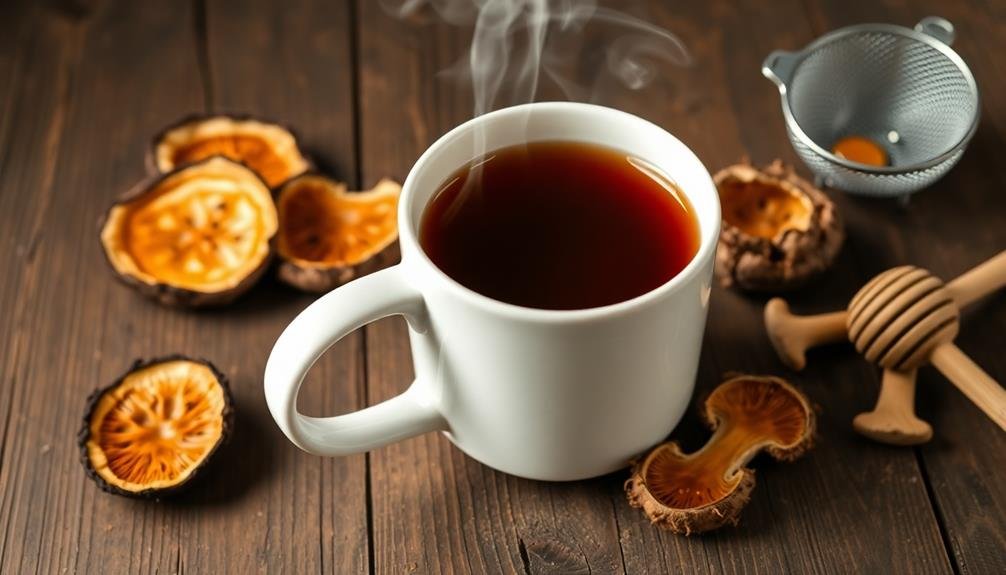
To make your own immune-boosting mushroom tea at home, you'll need to start by choosing the right fungi.
You'll want to focus on selecting medicinal mushrooms like reishi, chaga, or lion's mane, which are known for their immune-enhancing properties.
Once you've got your mushrooms, you can explore various brewing methods, from simple steeping to extended simmering, to extract the maximum benefits from your chosen fungi.
Selecting the Right Mushrooms
When it comes to whipping up your own mushroom tea, choosing the right fungi is essential. You'll want to focus on medicinal mushrooms known for their immune-boosting properties. Reishi, chaga, and turkey tail are popular choices, each offering unique health benefits.
Reishi is renowned for its stress-reducing and sleep-improving qualities, while chaga is packed with antioxidants. Turkey tail is praised for its potential to enhance immune function.
Look for high-quality, organic mushrooms from reputable sources. You can find them in health food stores, specialty shops, or online retailers. They're available in various forms, including dried whole mushrooms, powders, or pre-packaged tea bags.
If you're new to mushroom tea, start with milder varieties like shiitake or maitake before moving on to stronger flavors. Consider your personal health goals when selecting mushrooms. Some, like cordyceps, are known for boosting energy, while lion's mane is associated with cognitive benefits.
You might also opt for a blend of different mushrooms to maximize the range of potential health benefits. Always consult with a healthcare professional before incorporating new supplements into your diet, especially if you have existing health conditions or are taking medications.
Brewing Techniques and Tips
Now that you've selected your mushrooms, it's time to brew your immune-boosting tea. Start by chopping or grinding your dried mushrooms into small pieces to increase their surface area. For every cup of water, use about 1-2 teaspoons of mushroom powder or 3-4 grams of dried mushrooms.
Bring water to a boil in a pot, then reduce the heat to low. Add your mushrooms and let them simmer for 20-30 minutes. For a stronger brew, you can extend the simmering time up to an hour. Strain the tea through a fine-mesh strainer or cheesecloth to remove any particles.
You can enhance the flavor by adding honey, lemon, or ginger. If you're using reishi mushrooms, which can be bitter, consider blending them with other herbs or sweeteners.
For convenience, you can make a larger batch and store it in the refrigerator for up to a week.
To maximize the extraction of beneficial compounds, some people prefer to use a double extraction method. This involves first simmering the mushrooms in water, then steeping them in alcohol to extract additional compounds.
However, this process is more time-consuming and may not be necessary for daily consumption.
Flavor Enhancers and Complementary Herbs
While mushroom tea offers numerous health benefits, its earthy flavor isn't for everyone. Luckily, you can enhance its taste and potentially boost its effectiveness by adding complementary herbs and natural flavor enhancers. These additions can transform your medicinal brew into a more enjoyable and potent concoction.
Consider incorporating these popular flavor enhancers and herbs into your mushroom tea:
- Ginger: Adds a spicy kick and supports digestion
- Cinnamon: Provides a warm, sweet taste and helps regulate blood sugar
- Lemon: Brightens the flavor and increases vitamin C content
- Honey: Sweetens naturally and offers antibacterial properties
When selecting complementary herbs, choose those that align with your health goals. For instance, add echinacea to further boost immunity, or chamomile for relaxation.
You can also experiment with adaptogenic herbs like ashwagandha or holy basil to enhance stress-fighting properties.
Remember to start with small amounts of any new ingredient and gradually increase to find your preferred balance. By customizing your mushroom tea with these flavor enhancers and complementary herbs, you'll create a more palatable and potentially more effective immune-boosting beverage tailored to your tastes and health needs.
Brewing Methods and Techniques
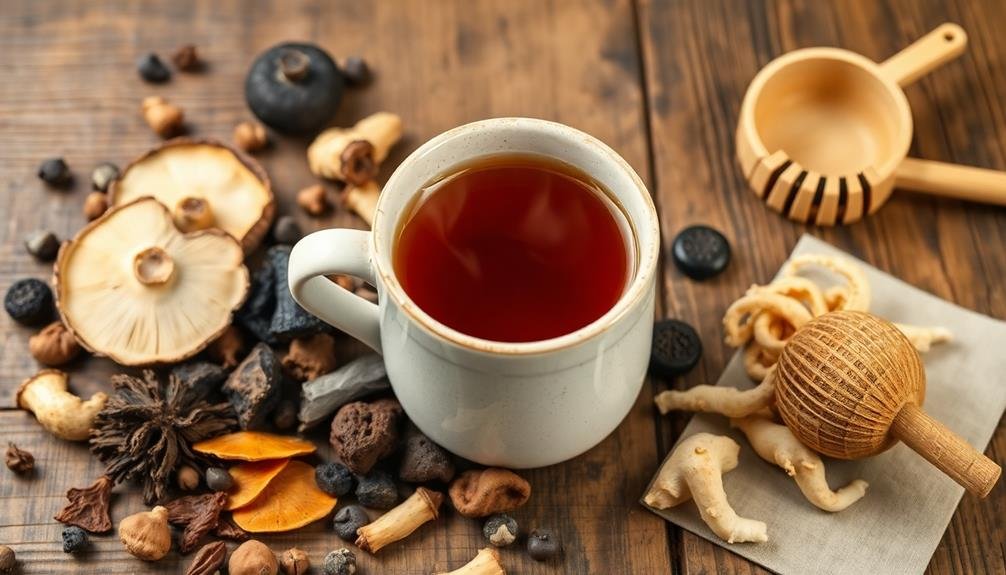
Brewing the perfect cup of mushroom tea requires attention to detail and the right techniques. Start by choosing high-quality dried mushrooms or a pre-made mushroom powder. If using whole mushrooms, grind them into a fine powder using a coffee grinder or mortar and pestle.
For hot brewing, bring water to a gentle simmer (not boiling) and add 1-2 teaspoons of mushroom powder per cup. Steep for 10-15 minutes, stirring occasionally. You can use a French press or tea infuser for easier straining. For a stronger brew, simmer the tea on low heat for up to 30 minutes.
Cold brewing is another option. Mix the mushroom powder with room temperature water and refrigerate for 8-12 hours. This method can result in a smoother, less bitter taste.
For maximum absorption of beneficial compounds, add a small amount of healthy fat like coconut oil or MCT oil to your tea. You can also blend the tea into a latte or smoothie for a creamier texture.
Experiment with different brewing times and temperatures to find your preferred strength and flavor profile.
Health Benefits and Precautions
Packed with bioactive compounds, mushroom tea offers a range of potential health benefits. It's known to boost your immune system, potentially reducing the risk of infections and improving overall health.
The antioxidants in mushroom tea may help fight inflammation and protect your cells from damage caused by free radicals. Some studies suggest that certain mushroom varieties used in teas can support cognitive function and mental clarity.
Here are some key health benefits of mushroom tea:
- Enhances immune function
- Reduces inflammation
- Supports heart health
- Improves digestion
While generally safe for most people, it's important to exercise caution when consuming mushroom tea. If you're pregnant, breastfeeding, or have a medical condition, consult your healthcare provider before adding it to your routine.
Some people may experience allergic reactions or digestive discomfort. Start with small amounts to gauge your body's response.
Be aware that mushroom tea can interact with certain medications, particularly blood thinners and diabetes medications. Always source your mushrooms from reputable suppliers to guarantee safety and quality.
Frequently Asked Questions
Can Pregnant Women Safely Consume Medicinal Mushroom Tea?
You should consult your doctor before consuming medicinal mushroom tea during pregnancy. While some mushrooms may be safe, others could pose risks. It's best to err on the side of caution and get professional medical advice.
How Long Does Mushroom Tea Stay Fresh After Brewing?
You'll want to drink your mushroom tea within 24-48 hours after brewing for ideal freshness. If you've stored it in the refrigerator, it can last up to 3-4 days. Always check for any off-smells before consuming.
Are There Any Drug Interactions With Medicinal Mushroom Tea?
You should be cautious about drug interactions with medicinal mushroom tea. It can affect how your body processes certain medications. Consult your doctor before drinking it, especially if you're taking blood thinners or immunosuppressants.
Can Children Drink Medicinal Mushroom Tea for Immune Support?
While medicinal mushroom tea may offer immune support, it's not recommended for children without consulting a pediatrician. You'll want to evaluate potential side effects and interactions. It's best to focus on a balanced diet for your child's immunity.
Is It Possible to Develop an Allergy to Medicinal Mushroom Tea?
Yes, you can develop an allergy to medicinal mushroom tea. While it's rare, your body might react to certain compounds in the mushrooms. If you notice any unusual symptoms after drinking it, consult your doctor immediately.
In Summary
You've now learned about the potent ingredients in medicinal mushroom tea and how to brew it at home. Remember, while these teas can support your immune system, they're not a cure-all. Experiment with different mushroom varieties and flavor enhancers to find your perfect blend. Always consult your healthcare provider before adding new supplements to your diet, especially if you have existing health conditions or are taking medications.

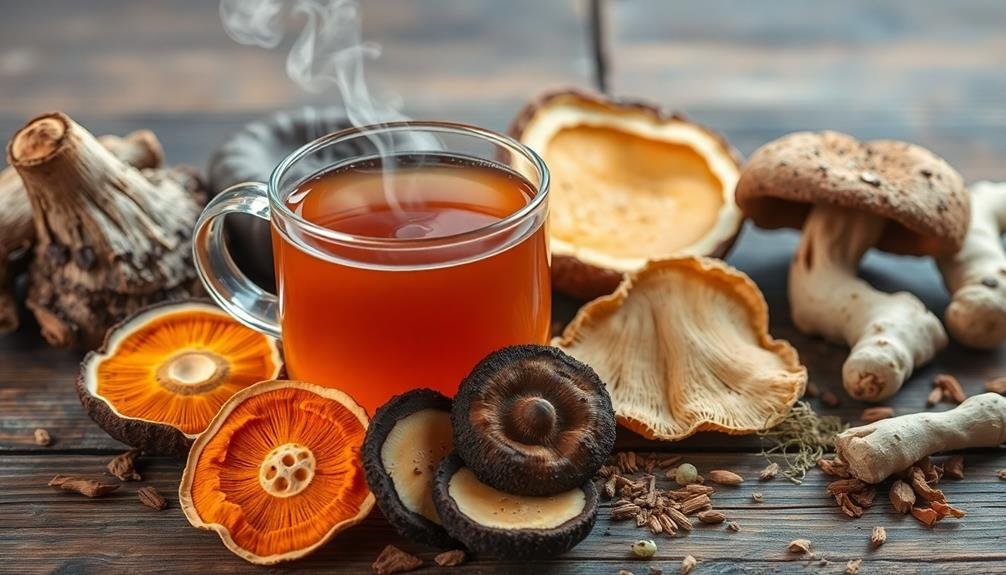


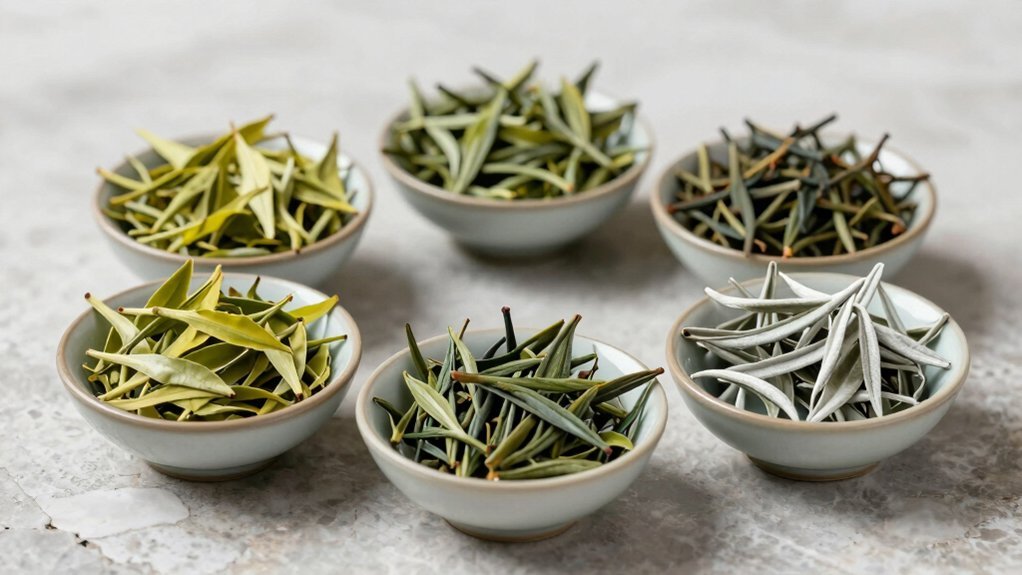
Leave a Reply